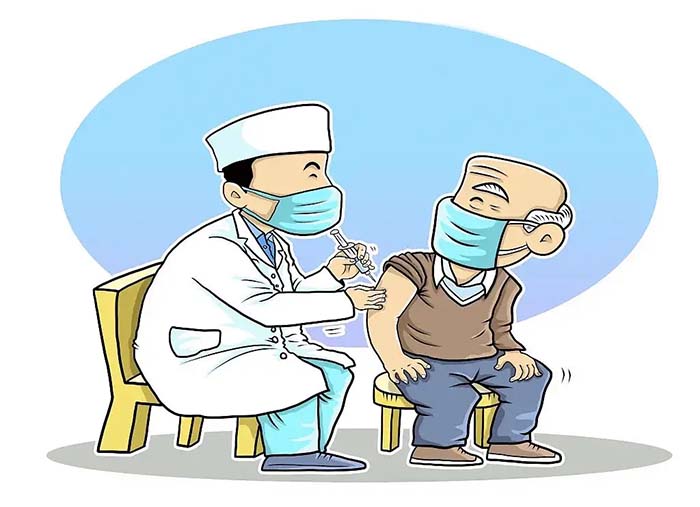FAQs on COVID-19 vaccination for seniors
In this article the China CDC answers frequently asked questions about COVID-19 vaccination for the elderly.

1.Q: Why are seniors advised to get vaccinated against COVID-19?
A: Based on the analysis of data on infection, severe illness, and death from COVID-19 around the world, people aged above 60 are at higher risk for severe illness and death from COVID-19.
The age group also demands the most medical resources during the epidemic because the elderly tend to need hospitalization and emergency treatment and have longer hospital stays. So it is important to get seniors vaccinated against COVID-19.
According to the World Health Organization's recommendations, elderly people or people with an underlying health condition are among the priority groups for vaccination in countries or regions with the pandemic.
2.Q: Some elderly people believe they do not need to get vaccinated because they live in remote areas, rarely go out or travel, and have a low risk of COVID-19 infection. Is this correct?
A: Due to the ease of transportation and the quick flow of people, no place is completely isolated from the virus. Some imported variants of the virus are highly contagious and some infections show atypical or even no symptoms.
For the elderly who mostly stay at home or live in remote areas, there is still a possibility of getting infected. If they have family members who work or study at another location, the virus could be carried home and infect them.
It is therefore advised that seniors get vaccinated as soon as possible to protect themselves as well as others.
3.Q: What is the current vaccination schedule for seniors?
A: The vaccination schedule for seniors is the same as that for other adults.
1.Inactivated COVID-19 vaccine (Vero cells): two doses; the second dose should be taken between three and eight weeks after the first.
2.Recombinant COVID-19 vaccine (type 5 adenovirus vector): one dose.
For the above two vaccines, booster shots should be taken within six months of the first dose.
3.Recombinant COVID-19 vaccine (CHO cells): three doses.
For this type of vaccine and the vaccination schedule, seniors should consult the local vaccination clinic.
4.Q: Is it necessary for seniors to get a booster shot and why?
A: Yes, it is necessary. Since seniors generally have a weakened immune system, people above the age of 60 generate a lower level of antibodies and have weaker protection than people aged 18-59 after completing routine vaccination. They also face a higher risk for severe illness and death after infection. Therefore, seniors are recommended to get a booster shot six months after being fully vaccinated with inactivated or adenovirus vector vaccines for better protection against the disease.
There have been studies showing that the risk of severe disease and death after infection is reduced by more than 90 percent for seniors who have received booster shots.
5.Q: Should seniors choose to receive a booster shot developed with the same or different technology from those used in initial inoculations?
A: A booster dose that is developed with the same technology as the initial inoculation or one that is developed with a different technology are both effective in lowering the risk of severe disease and death from COVID-19. Seniors can choose their vaccines based on local vaccine supplies.
6.Q: What are the precautions for seniors getting a COVID-19 vaccine shot?
A: Seniors need to know whether they have chronic diseases or not. If they are not sure, ask their doctor or the onsite doctor at the vaccination in advance.
Seniors need to know about all the information and requirements regarding COVID-19 vaccination in advance, and remember to bring their ID cards.
Seniors should wear loose-fitting clothes for inoculation and inform the doctor of their health conditions, complete the process of informed consent, and receive approval after the doctor's assessment before being vaccinated.
Seniors should stay on site for 30 minutes after vaccination and leave only after confirming there are no adverse reactions.
After vaccination, family members of seniors should pay attention to their conditions. If they experience adverse reactions, family members should report to the site of vaccination and seek medical treatment immediately.
7.Q: Is there a maximum age for seniors to get the COVID-19 vaccine?
A: Seniors are the priority groups of COVID-19 vaccination. In terms of age, there is only a lower age limit for COVID-19 vaccine, and no upper age limit is set.
8.Q: Under what conditions should seniors above the age of 60 delay vaccination or not get vaccinated?
A: Seniors above the age of 60 should postpone the vaccination or not get vaccinated if
(1) they are allergic to any ingredients of the vaccine or have had an allergic reaction to the same type of vaccine;
(2) they have had a severe allergic reaction to other vaccines (acute allergic reaction, angioneuroedema, dyspnea);
(3) they have uncontrolled epilepsy or other serious neurological diseases (transverse myelitis, Guillain Barre syndrome, demyelinating disease);
(4) they have fever or an acute disease, they are experiencing acute attacks of a chronic disease, or they have an uncontrolled severe chronic disease.
9. Q: Will there be additional risks or increased adverse reactions when the seniors get vaccinated?
A: Based on the results of previous clinical trials, the COVID-19 vaccine has a good safety record and immunity effect. The number of local adverse reactions reported such as fever and rash in seniors is lower than that in the general population.
10. Q: Do seniors face additional risks or adverse effects after getting vaccinated?
A: China has been closely monitoring the potential adverse effects of COVID vaccination. Data shows recipients above the age of 60 are slightly less likely to experience adverse effects after receiving a vaccine shot than those below 60.
Most recipients above the age of 60 report common adverse effects. Severe adverse effects are very rare, and are reported with a frequency of less than one in a million. Therefore, risks from vaccination are very low.
11.Q: How can those who are unvaccinated due to health conditions better protect themselves against the disease?
A: Avoid going to crowded places or enclosed spaces, and reduce contact with strangers or people from other places.
Wear masks when in contact with strangers, going to indoor public places or taking public transportation.
Wash or disinfect hands often and avoid touching eyes, nose and mouth with hands.
Keep rooms well-ventilated.
Family members and caregivers who have contact with the elderly should get vaccinated and maintain good personal hygiene.
12.Q: How to prevent the coupling reaction of vaccination for seniors?
A: The coupling reaction refers to the fact that the recipient is in the incubation period or early stage of a disease when in the process of vaccination, and the disease happens by coincidence after vaccination.
Therefore, the coupling reaction is not caused by vaccination, and is not an adverse reaction to it.
Seniors are more likely to have some health problems with an advanced age. Taking appropriate measures to delay vaccination can reduce some coupling reactions, but it is very difficult to avoid them completely.
